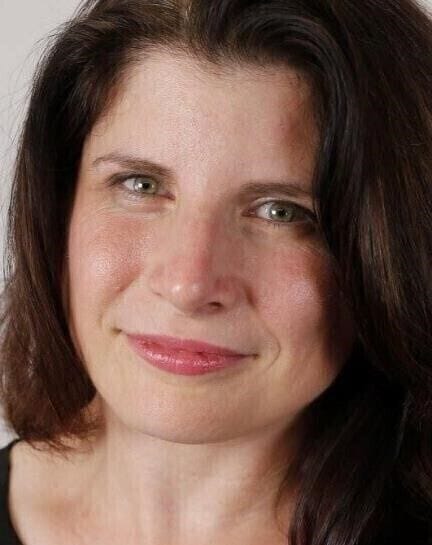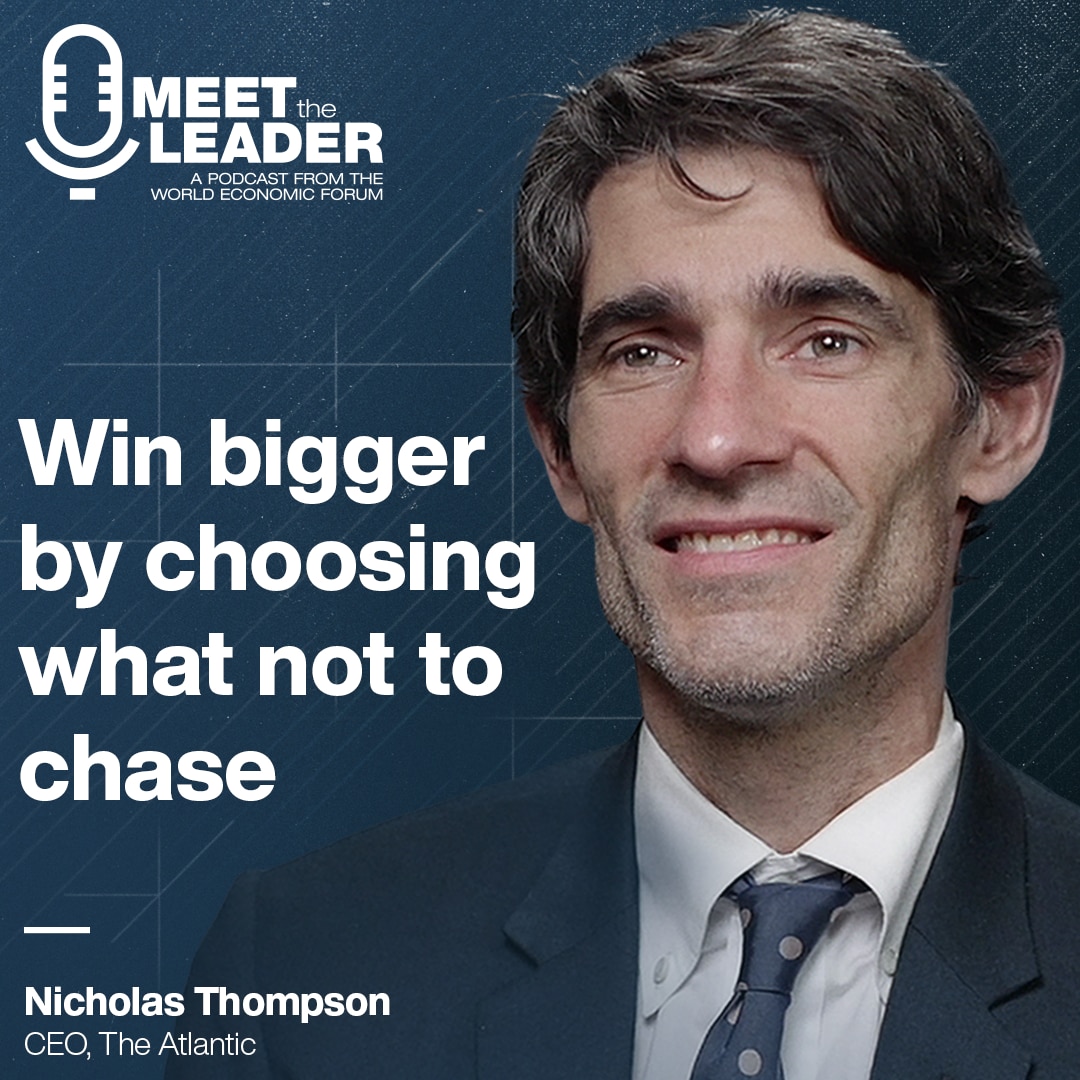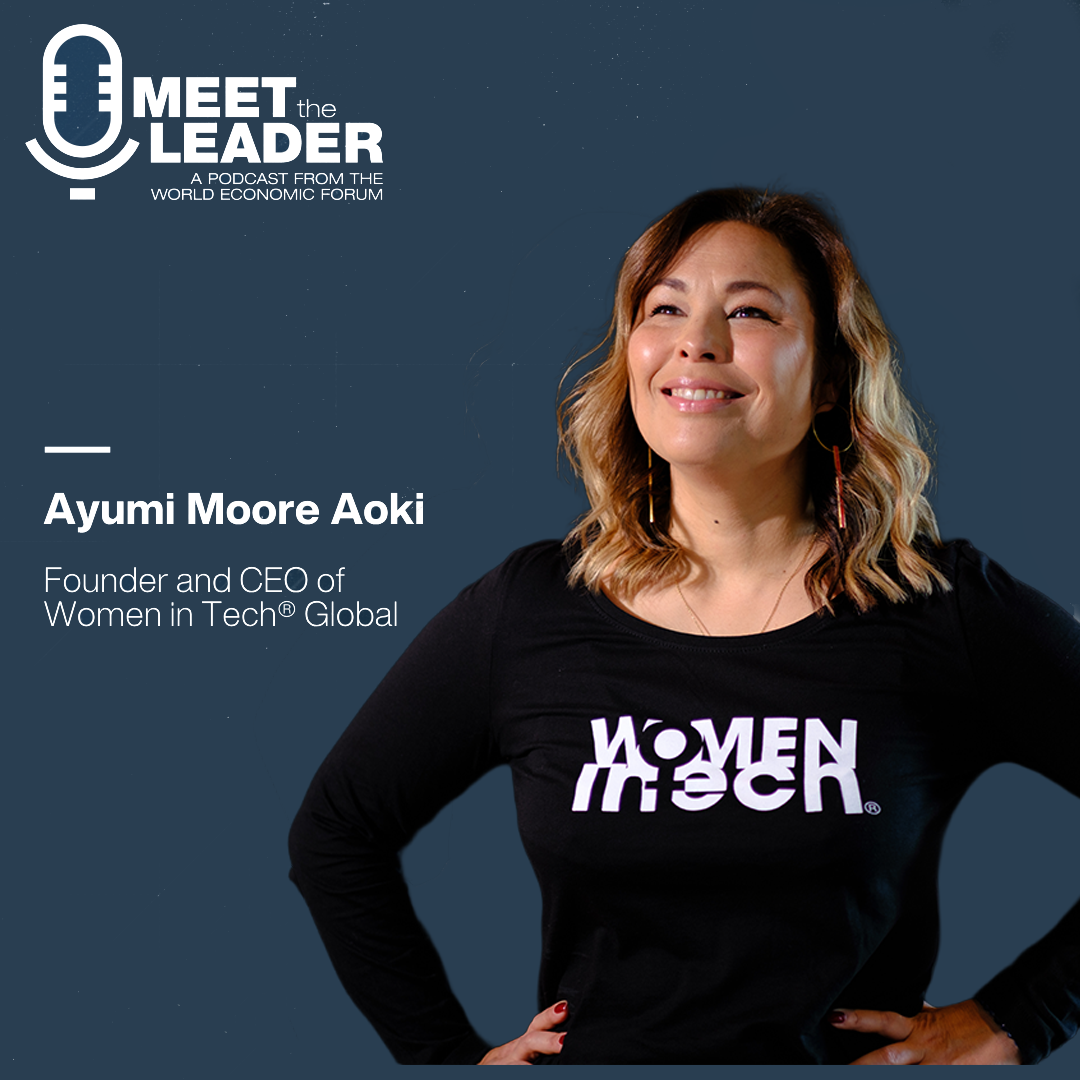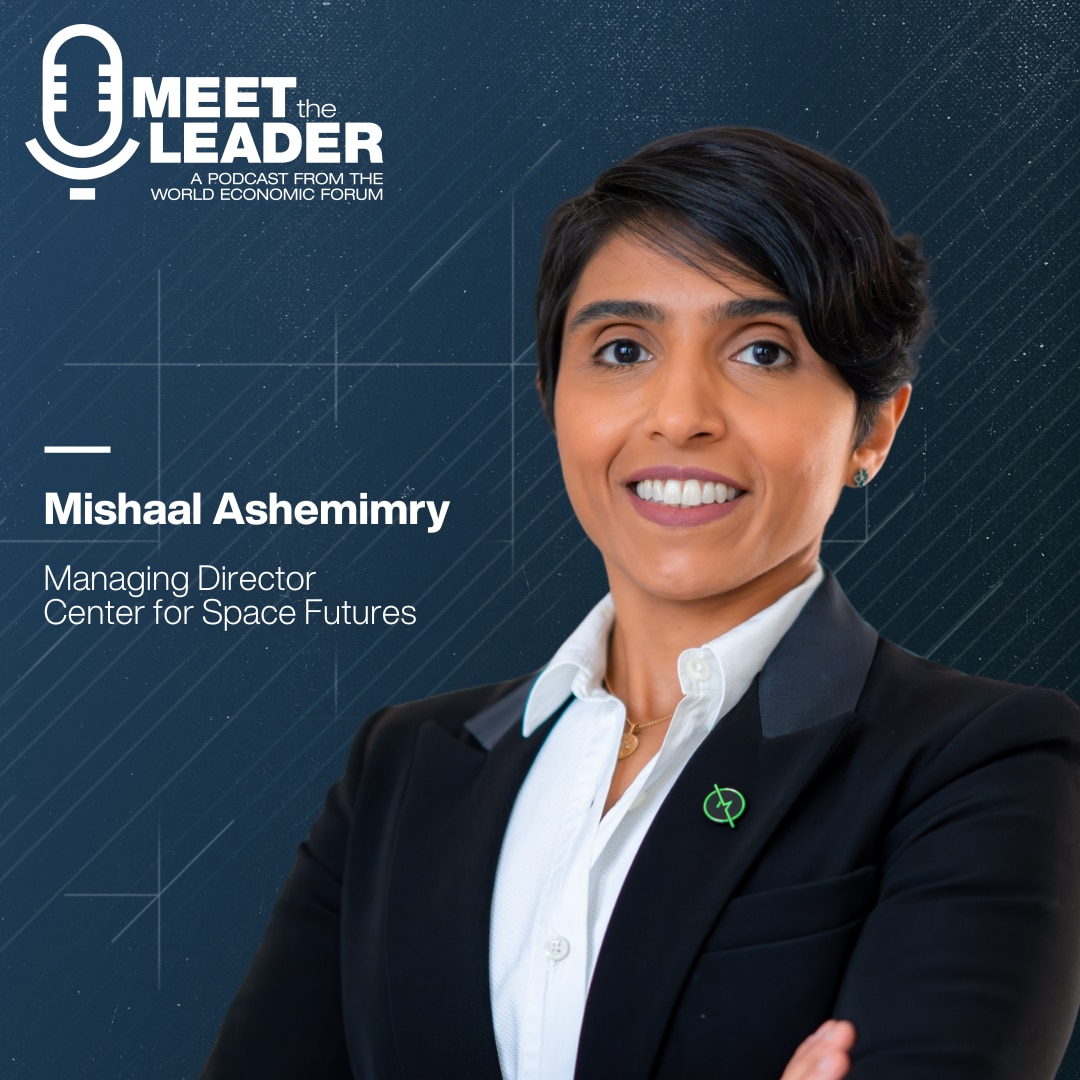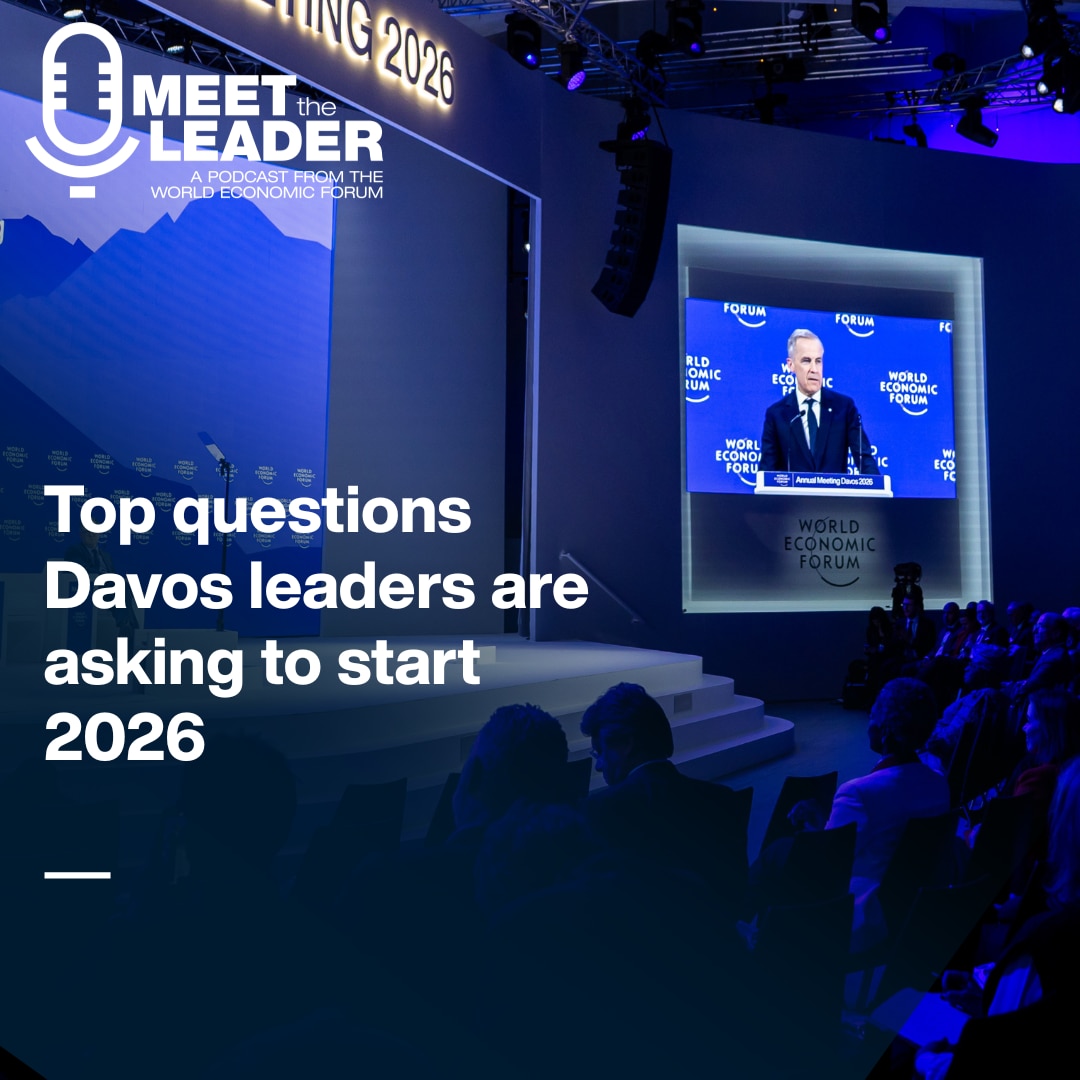Workers have changed - How leaders must adapt: Randstad's Sander Van't Noordende
ポッドキャスト・トランスクリプト
This transcript has been generated using speech recognition software and may contain errors. Please check its accuracy against the audio.
Sander Van't Noordende, Randstad Companies are losing out, teams are losing out and individuals are losing out.
Linda Lacina, Meet The Leader Welcome to Meet the Leader, the podcast where top leaders share their tackling the world's toughest challenges. In today's episode we talked to Randstad CEO Sander Van't Noordende all about what workers want now and what leaders will need to do to adapt.
Subscribe to Meet the Leader on Apple, Spotify and wherever you get your favorite podcasts. And please don't forget to rate and review us. I'm Linda Lacina from the World Economic Forum and this is Meet the Leader.
Sander Van't Noordende, Randstad Because talent is scarce, they are much more powerful than they were. Some of them will vote with their feet.
Linda Lacina, Meet The Leader For more than 20 years, Randstad, a global talent and recruiting company, has conducted a special Workmonitor survey. This year, it polled 27,000 people in 34 markets around the world for a one of-a-kind snapshot on what motivates the most important asset in business: people.
This year's survey could come at a more interesting time. The past two years have been a whirlwind for workers and bosses. And workplaces are sometimes struggling to keep pace with what workers value and what they need.
And economists stress that big technological and demographic shifts are going to lead to labor shortages, meaning that understanding teams and how to retain them will be more important than ever.
To get to the bottom of these trends, I talked to Sander Van't Noordende, Randstad's CEO. He talked to me about what surprised him about the survey and how leaders will need to change and adapt to the workplaces they're guiding right now.
He'll talk about all that. But first -- He'll share more about the research.
Sander Van't Noordende, Randstad This is a longstanding program that we've been involved in. And this year's results are particularly interesting because you could say we have a split workforce, a split workforce along three dimensions: Ambition, balance and connection. Now let me talk a little bit about each of them.
If we talk about ambition. If you ask people, are you ambitious? Only 50% actually says yes. 50% says, "I'm good with making no progress in my career. I'm good with my job. I want to learn new things, but I do not necessarily want to progress." So 50/50, that's a I would say, watershed moment.
Also, on balance, it's becoming a very interesting game. 50% of the people say pays more important, 50% of the people say balance is more important. So also there, that' 50/50 distribution.
On connection, there's better news on connection with the company as such. 70% of people say, I feel connected to the purpose of my organization and the views and the culture that we have here. However, 50% of people is still hiding things about themselves from their colleagues. That can be something about your family, about your health situation, about your sexuality. So we haven't quite reached, let's say, the full belonging just yet. So that's the new ABC of talent.
The interesting thing is also we have a multi-generational workforce. So this is not just solving all that, the ABC equation for one type of population, but is for all generations in the workforce. And we have five generations in the workforce these days.
And then the interesting thing is, if you ask people, employees, does your organization understand your generation? 30-40% says, my organization doesn't really understand my generation, regardless of the generation that that you're in.
So now you have these different desires of people. Balance, pay, ambition, limited progress, belonging. View -- aligned with the views of the company. And you have two different generations. Now you almost need to say your career discussion is now a, you know, a one-on-one discussion between the organization, between employer and employee, rather than a one-size-fits all that we came from. We've moved on from that, of course, in many organizations, but it's going to be very individualized. What's your level of ambition? How do you look at the views of the organization and are you aligned and what can we do about that in terms of balance, flexible work or not, flexible hours, flexible place. You know, so all those dimensions need to be taken into account in that career discussion.
Linda Lacina, Meet The Leader Middle managers are stretched. They've always been stretched. How can leaders make sure that they are working this in to the block and tackle? When there's a swarm of work to do. What questions should they have to do when there's maybe habits that need to be kind of adapted? What should they do?
Sander Van't Noordende, Randstad So in terms of the performance reviews, many organizations are moving on from the performance review -- The annual one had an annual interview or whatever you want to call it -- into what you could call micro evaluation moments or micro-performance review moments, because especially the younger generation, they want instant feedback right after the sales meeting or right after you've done that presentation, you know, take someone aside, a good job here and here, think about you can improve on that element. So it needs to become a much more natural part of how we collaborate. And the collaboration is about, okay, the work at hand. But the collaboration is also about, you know, how have you done and where can you improve.
Linda Lacina, Meet The Leader And how important is that a micro feedback. What's lost if we don't do it?
Sander Van't Noordende, Randstad Well, what's lost if we don't do it is performance improvement. What's lost is that next sales meeting will not go better if we don't give each other feedback. Companies are losing out, teams are losing out and individuals are losing out.
Companies are losing out, teams are losing out and individuals are losing out.
”Linda Lacina, Meet The Leader What else surprised you about the findings that you had from the research?
Sander Van't Noordende, Randstad One interesting thing about the research, and there is a group and I call them the assertive one third of the employees. And this is a group of employees that will not accept a job or is even willing to quit "if." And the "if" can be if I cannot meet my ambitions. The "if" can be if there's no flexible work. The "if" can be if I don't feel belonging, the "if" can be "if" I don't get sufficient training.
Now this is all not all the same one third. But the point here is there's one third of people who are assertive enough to vote with their feet, or not even join your organization if they don't find what they're looking for. And again, that's back to that individual value proposition for talent. So the Assertive One Third is definitely something to reckon with.
Linda Lacina, Meet The Leader There's a little bit of attention point between what employees sort of want and what workplaces are really set up for. How can leaders navigate that? How can they bridge that gap?
Sander Van't Noordende, Randstad Well, it's very important that employers know what their employees are looking for. Knowing it is the first step. And then having the individual conversation and accommodating is obviously the second step. It's almost like you have to start thinking about your talent as your customers. Because talent is scarce. They are much more powerful than they were. And again, back to that Assertive One Third, some of them will vote with their feet.
You have to start thinking about your talent as your customers. Because talent is scarce, they are much more powerful than they were.
”Linda Lacina, Meet The Leader You mentioned labor shortages. What else should leaders be doing as the global labor market shifts?
Sander Van't Noordende, Randstad With talent being scarce, leaders in organizations have to really have a clear talent strategy. Or you can say almost a work strategy. meaning what work is going to be done where what work requires what skills, and what work needs to be done at what cost level. So all those things come into play to strategize who will do the work for an organization and where and when and how.
And of course, the role of technology and automation comes into play there as well, because there might be pieces of work that technology can do. So that strategy is really important.
Of course, then you need to execute that strategy across a contingent of workforces that can be your own workforce, that can be an extended workforce through an outsourcing partner, that can be an extended workforce through a talent partner like Randstad. So what's your strategy there? How are you going to get the work done?
And then the last thing is, I would say, employers need to set the right tone and environment. And because you need to treat all the people who work for your organization almost in a similar way. Everybody who's in the building gets invited to the party. That's a very simple example. But there will always be people in your building that may not be on your payroll, but they will feel excluded if they're not invited to the party. And the party stands, of course, for a lot of other things, as well. So having a consistent approach of the employees across the workforce is, no matter where they are from, I think is really important.
Linda Lacina, Meet The Leader As they create this work strategy. What are the points when they should maybe recalibrate, right? I mean, doing it just once a year isn't long enough. Maybe calendar basis isn't relevant. Right. What are the trigger points that should make them think, okay, now it's time for me to maybe check in and see if I need to modify this at all.
Sander Van't Noordende, Randstad Yeah. So the strategy I would say is for is like a 3-to-5 year strategy. The execution, you know, needs to be very agile because your clients changes your business changes, the economy changes. Things happen in countries from a geopolitical point of view. So you really need to be on the ball, all the time and course correct where needed. But you always course correct against the backdrop of that medium- to longer-term strategy.
Linda Lacina, Meet The Leader What else can leaders be doing right now to futureproof their pipelines or talent pipelines.
Sander Van't Noordende, Randstad To futureproof your talent pipeline I think it's important to be always out there in the labor market through your talent ecosystem, and Randstad is often a number one partner in our clients' talent ecosystem.
So you have your own talent acquisition team. You have all your employees, of course. They need to be telling a good story. You have your talent ecosystem, so you need to make sure you have multiple channels into the market. And you need to make sure that you really have a good overview of all the different talent groups and are connected to the relevant ones.
And that comes to being connected to diverse talent groups: men, women, people of different ethnicities, people with a disability, LGBTQ people. So make sure you got your sensors out everywhere. Because if you're looking for the best talent, you should not look in just one space or place. You should look in multiple places.
Linda Lacina, Meet The Leader Young people who graduate this spring, they're going to have a career that we've never imagined because they'll be living longer. Pace of disruption and change will be quicker and quicker and quicker. What's a tangible thing they can do as they enter the workforce that can sort of help them be poised for success?
Sander Van't Noordende, Randstad I always say, and I've been saying that actually for 30 years. I think there are three very important characteristics. I would say one is I call initiative. You know, don't wait for someone to ask you to do something, but, you know, just do it and get work done, whatever it is. I think that's really, really important.
Then in terms of what you do and how to do it, you know, just do it that more, that better, then the expectation is because, you know, you will enjoy it better. You will have a happy client or a happy manager or whatever. I think that's really, really important.
And then last but not least, I would say personal connections. And despite all the technology there is out there, ultimately, people make the world go round. And it's about the connection that you have with your customer, that you have with your colleague, that you have with your manager. Personal connections and your network that is ultimately, you know, a very important differentiator in a successful career.
Personal connections and your network are ultimately a very important differentiator in a successful career.
”Linda Lacina, Meet The Leader Yeah. Let's talk about your personal career. Is there a turning point that you had in your career that maybe changed how you lead? Maybe you hit a wall and you had to think about something differently, or you just had to realize, oh gosh, I have to think about this in a completely new way. What's the turning point you had?
Sander Van't Noordende, Randstad Yeah, my turning point in my career when it comes to leadership was actually a mistake I made. And I made the mistake to change my leadership style. My style is generally quite personable, you know, fairly informal. And I thought, I'm going to be a bit more disciplined. It didn't work. So I changed my leadership back to who I really am. And from there on, things were a lot more successful than they were in that interim period. I would, I would say. So correcting a mistake is also, you know, a way to improve.
Linda Lacina, Meet The Leader Is there a piece of advice that you've always been grateful for?
Sander Van't Noordende, Randstad An insight that I've always been grateful for is, you know, when people are passionate, sometimes maybe even angry, that means, you know, you may have done something not perfect, but it means they care. So don't take anger too personally. You know they care about what you're doing, you know, listen and take it from there. That's an important insight I learned.
Linda Lacina, Meet The Leader How has it helped you?
Sander Van't Noordende, Randstad Well, it helped me to sort of not internalize other people's anger. This person is not happy with the work I did. That's fine. Let's listen. Try to understand where they're coming from. Empathize, so to speak. See what action we can propose and how we can move on. If you internalize other people's anger, you know it's a lot of stress and doesn't help anyone.
Linda Lacina, Meet The Leader Is there a trait or a habit that if you didn't have this, you wouldn't be you?
Sander Van't Noordende, Randstad Yeah. So very important habit that I have and that really works well for me is, you know, taking a time out, taking some time for myself. Taking a blank sheet of paper. What do we need to do as an organization in the next three, six, nine months, or maybe in the next three years, sometimes. And write that down for myself and then socialize with my team to sort of see if what's the next agenda that we now need to execute.
So taking some time off, I mean, not always be in the meeting, not always be out there at the clients or talking to investors. Those are all very important things. But, you know, take some thinking time and draft the actions or the agenda for the next couple of months or couple of quarters or couple of years, I think is really important.
Linda Lacina, Meet The Leader A lot of people are talking about workplace trends. Are there some there that you think, hey, you know what, everyone's talking about this. But no one's really talking about this. This is being overlooked. What's being overlooked in your mind?
Sander Van't Noordende, Randstad There's a lot of talk about flexible work. I'd rather people talk more about skills and training and how do we make sure we're future ready than the whole debate about flexible work. I think the the debate about flexible work is sort of going round in circles. I think the conclusion is flexible work is here to stay. We need to work with our employees to define how exactly. But a world of no flexible work is not going to come back. So let's move on and let's focus on skills and the future of our organizations.
Linda Lacina, Meet The Leader When it comes to skilling, a lot of employers, historically haven't invested enough in skilling, and not because they don't want to. In some cases, they might think they're okay. They're set. We have what we need. What can they look for in their organization to be like, okay, how can they kind of tell, hey, what I need to build up here? I need to show up over there. What should they be thinking about and planning for?
Sander Van't Noordende, Randstad Yeah, I don't think there's any CEO that would say we have what we need. Talent shortages are in the top three for every CEO that I meet. I think the challenge around skilling is for the employees is to connect the skills they build to the career they make, or in some cases, even more specific, to connect the skills they build to the next job they're going to get. Because it depends a little bit on if you're more in a practical career, if you have an order picker in a warehouse and you build for and you say, go on the training to be a forklift driver, then you can be a forklift driver, then you can have 40% more salary. So connecting the skill building to the next job or connecting the skill building to the career more in the knowledge worker world, if you will.
Linda Lacina, Meet The Leader We've talked about, here at Davos, all these sort of global risks that are coming down the pike, both in the near term and sort of in the next five, ten years. Given that. What do you think leaders should be doing this year in 2024, to make sure that we are in good stead for who we want to be? Maybe five years, ten years down the line.
Sander Van't Noordende, Randstad Yeah, well, first of all, you need to know who you want to be. Five, ten years down the line. And in these days, there is no strategic plan for 5 or 10 years anymore. So yes, you have to set an aspirational goal. So at Randstad we say we want to be the world's most equitable and specialized talent company. And that's aspirational. Talent because we are about talent. That's the agenda we help our clients with. That's the talents we helping the marketplace find a job and build a career.
Equitable. Very simple. Talent is scarce. We need everybody on the pitch. And we need to make sure that the playing field is leveled. Everybody has a good chance to get through the process.
Specialized because our clients are looking for specialized people, not just people, to show up on Monday morning. So having that vision that northstar for your company, even if it's in broader terms, I think is a very important thing to have because then you can complement that with specific strategies for your customers, for your talents, for how you deliver, for your technology, and of course, how you want to shape your own team. But having that vision is really important.
Linda Lacina, Meet The Leader That was Sander Van't Noordende. Thanks so much to him, and thanks so much to you for listening.
Find a transcript of this episode, as well as transcripts from my colleague's podcast, Radio Davos at wef.ch/podcast. This episode of Meet the Leader was produced and presented by me with Jere Johansson and Taz Keller as editor. Juan Toran as studio engineer in Davos and Gareth Nolan driving studio production.
That's it for now. I'm Linda Lacina. From the World Economic Forum. Have a great day.
What workers want - and what keeps them motivated - has changed drastically in recent years. And with big technological and demographic shifts driving labor shortages, knowing how to both retrain and retain your workforce will be more important than ever. Randstad CEO Sander Van't Noordende will share insights from the talent firm's annual Workmonitor survey, giving a one-of-a-kind snapshot on how workers are thinking about everything from ambition, to purpose, to flexibility and pay. He'll also share what new habits leaders will need to adopt (including the value of microfeedback) and how leaders should be approaching everything from how they connect with workers to how they future proof their talent pipelines.
トピック:
リーダーシップその他のエピソード:
「フォーラム・ストーリー」ニュースレター ウィークリー
世界の課題を読み解くインサイトと分析を、毎週配信。



